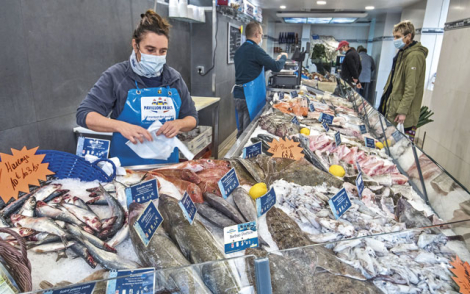|
78 million tons of plastic produced each year Only 10% are recycled worldwide
0.75% the share of bioplastics in the global market |
Automated processes and eco-designed packaging Time for The smart factory ! Constant innovation is going on in the world of seafood processing with, of course, significant progress in automation via the circulation of information and even robotization. Marel, which is multiplying XXL plants throughout the world, is promoting ever more connected factories. ,"Production processes are automated and interdependent, and computerized solutions for production control are becoming necessary," points out Yann Tanguy, Innova sales manager for Marel France. ,"Data control is essential". The company is keen on the concept of "smart factory", talking in particular about artificial intelligence (machine learning) and robotics. Precise jets of water cut out and closely trim fish fillets, robots place them in trays... sophisticated technologies are increasingly accessible and there is a demand for global solutions. Baader, for example, benefits from expertise acquired over a hundred years of development in the industry. ,"Our approach," says Christian Moreau, the brand's distributor in France, "is now less about installing one or two machines than about designing complete lines and developing concepts from A to Z, including slaughtering, gutting, filetting and other operations".
Simple and agile Down the production line, regarding finished processed products, solutions offered by companies create value with equipment which also evolves over time. Packaging machines, for example, reflect eco-design thinking. To limit plastic consumption, they can work with thinner films, reduce cutting waste to a minimum... GEA has thus motorised and synchronised the unwinding of the upper and lower films on its new PowerPakPlus thermoforming machine to limit film tension and the risk of breakage. According to Gwenvaël Peres, Guelt's sales manager, another current feature, in addition to ease of maintenance and cleaning, is the need for flexibility: "Manufacturers want equipment to be easily adapted to any new developments, in terms of containers, among other things. This is the « simple and agile » era. The idea is not to freeze the offer".
Less fantastic plastic At the time of "zero waste" and " carbon footprint reduction" requirements, legislators take a stance and chain stores put pressure on their suppliers for recyclable, re-usable or compostable packaging. As a result, manufacturers are making increasing use of rPET (recycled PET). Faerch offers food trays made of this material. Eco-design, new material... if the trend is towards mono-materials, the point remains to preserve the qualities of the complex materials, which provide a barrier to oxygen and humidity, a functional solidity, an extended shelf-life and resistance to different processes (heat...).Ways forward are emerging in the world of bioplastics, made from bio-sourced and/or fully bio-degradable materials. Dominique GUILLOT Traduction : Catherine ROUSSEY |

